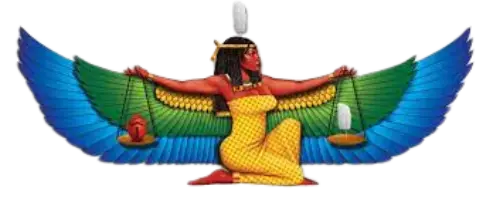
The Ancient Kemetic/Egyptian Principle of Cosmic Balance
Ma’at is an Ancient Kemetic concept embodying harmony and balance in both the physical and moral worlds. It represents the ideal state of equilibrium and justice, where order prevails over chaos. Ma’at is also personified as a goddess with a feather on her head, symbolizing truth’s weight in the afterlife judgment of hearts.
In practical terms, Ma’at governed Kemetic society, emphasizing justice, respect for one another’s rights, and cosmic balance. It was a duty for pharaohs and citizens to uphold Ma’at to prevent chaos. This enduring concept underscores the importance of ethical and harmonious living in Ancient Kemetic culture and spirituality.
Ma’at’s emphasis on harmony, justice and cosmic order remains highly relevant in modern times. As society grows more complex with advanced technology, we face rising chaos unless we consciously uphold ethical values. Ma’at teaches that liberty and order depend on each person taking responsibility for moral thoughts and actions. When greed, corruption and exploitation throw systems out of balance, the poor and vulnerable suffer most. Upholding Ma’at means speaking truth, promoting fairness, and creating mutual understanding between all people despite differences.
In past centuries, Ma’at waned under colonial abuses, slavery and racial oppression. Yet the concept endured in Africa’s cultural memory. After independence, some societies incorporated Ma’at principles into new governance systems and reforms. For instance, South Africa’s Truth and Reconciliation Commission drew lessons from Ma’at by allowing confession of wrongs while promoting social healing. Such restorative justice and conflict mediation practices align with Ma’at’s equitable, forward-looking morality.
Indeed, Ma’at continues evolving dynamically as globalization connects more cultures. Comparative ethics reveal parallels between ancient traditions worldwide that value hospitality, care for community, moderation, and defending the vulnerable. Just as Ma’at united ancient Kemetians across classes in mutual responsibility, its universal messages can inspire more inclusive, ethical societies today. From international courts to grassroots activism, cries for justice invoke Ma’at’s timeless wisdom: no one is free until we share the freedom, dignity, and balance that connect us.
